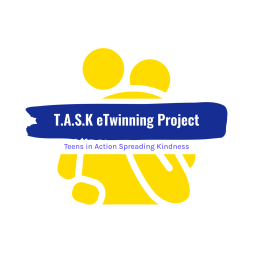Anti-bullying campaigns
Lara, Matilde, Gonçalo and Letícia from A.E de Sátão visited a group of 7th graders Religious Education lesson with classes A and C who are also partners in the TASK project to run their campaign against bullying and hold a session and a game on the topic.
Inspired by their Greek partners, the Anti-bullying team from 4th JHS of Chios, who had the idea to launch a White Teacher Campaign, they also held the campiagn in their school by insviting the whole community to wear a white T-shirt on the day of their presentation on 12th May 2023.
Read their report and watch their reflection video report below.
Click on the links in the report to see the resources they created (a presentation and an interactive quiz for the 7th graders and a version in Portuguese language for teachers of Citizenship to be used in their classes that was published on the school's website)
Anti Bullying Campaign Final Report (1) by mariasilva1970 on Scribd
See their report which contains the videos reports.
The 4th Junior High School Of Chios's Anti-Bullying Action report implemented in their community. The action plan was to have a White Shirt Day in order to raise awareness against bullying. Students also created leaflets,wrote anti-bullying messages and watched videos on bullying.Video of students participation included in the report.
Bullying_The 4th Junior High School of Chios_ Final Report on Your GYSD Community Action.docx by mariasilva1970 on Scribd
https://docs.google.com/document/d/168h3UUYjUezmEILihPrVSnNl7FMnjdoc/edit?pli=1
Fátima, Maria and Leonor from class 9.ºF in AE Cego do Maio wrote the following:
"We've looked into other people's ideas and really liked one that mentioned "give presentations to younger students".
We found that idea interesting because it will help the students to grow up and be able to identify a situation of cyberbullying in such young age and we think that this type of bullying, with the modernization of technology it will become much more common in the future!
We are also thinking that, usually children have a tendency to learn better when they are actually facing that situation, meaning that they are more likely visual learners and don't really like knowing things only "in theory".
We would bet on creating scenarios with the students and teach them on how to find the solution in different kinds of cyberbullying (for example: when THEY receive a offensive text, when THEIR friend receives an offensive message and is feeling down, when someone posts a picture making fun of someone, etc...); also make them do cyberbullying related activities like memory games or guessing games, and other interactive games or quizzes."


